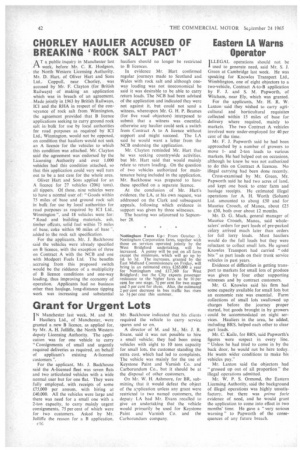ILLEGAL operations should not be 1 used to generate need, said Mr. S. J.
Page 44

If you've noticed an error in this article please click here to report it so we can fix it.
Green at Cambridge last week. He was speaking for Knowles Transport Ltd., Wimblington, one of eight objectors to a two-vehicle, Contract A-to-B application by F. J. and S. M. Papworth, of Witcham, near Ely, which was granted. For the applicants, Mr. H. R. W. Laxton said they wished to carry agri cultural and horticultural requisites collected within 15 miles of base for delivery where required, mainly to markets. The two Contract A vehicles involved were under-employed for 40 per cent of the time.
Mr. F. J. Papworth said he had been approached by a number of growers to move Iand 2-ton loads to various markets. He had helped out-on occasions, although he knew he was not authorized to do this on Contract A licences. No illegal carrying had been done recently.
Cross-examined by Mr. Green, Mr. Papworth said he had two acres of land, and kept one book to enter farm and haulage receipts. He estimated illegal operations for A. H. Worth (Soham) Ltd. amounted to about £50 and for Maurice Crouch, of Mance, about £25 to £30, both over about 12 months.
Mr. D. G. Mack, general manager ofMaurice Crouch, Manea, said whole
salers' orders for part loads of pre-packed celery arrived much later than orders for full lorry loads. Most hauliers would do the full loads but they were reluctant to collect small lots. He agreed Knowles Transport had carried "odd bits" as part loads on their trunk service vehicles in past years.
Evidence of difficulties in getting transport to markets for small lots of produce was given by four other supporting witnesses and by contract customers.
Mr. G. Knowles said his firm had some capacity available for small lots but an economic rate was essential. Farm collections of small lots swallowed up charges before the journey proper started, but goods brought in by growers could be accommodated on night services. Hauliers in the area, he added, including BRS, helped each other to clear part loads.
Mr. C. Kaile, for BRS, said Papworth's figures were suspect in every line.
"Unless be had tried to come in by the back door, he would not be here today. He wants wider conditions to make his vehicles pay."
Mr. Laxton said the objectors had "grossed up out of all proportion" the illegal operations admitted.
Mr. W. P. S. Ormond, the Eastern Licensing Authority, said the background of illegal operations was highly unsatis factory, but there was prima facie evidence of need, and he would grant the application to come into effect in two months' time. He gave a "very serious warning" to Papworth of the consequences of any future breach.
























































































































